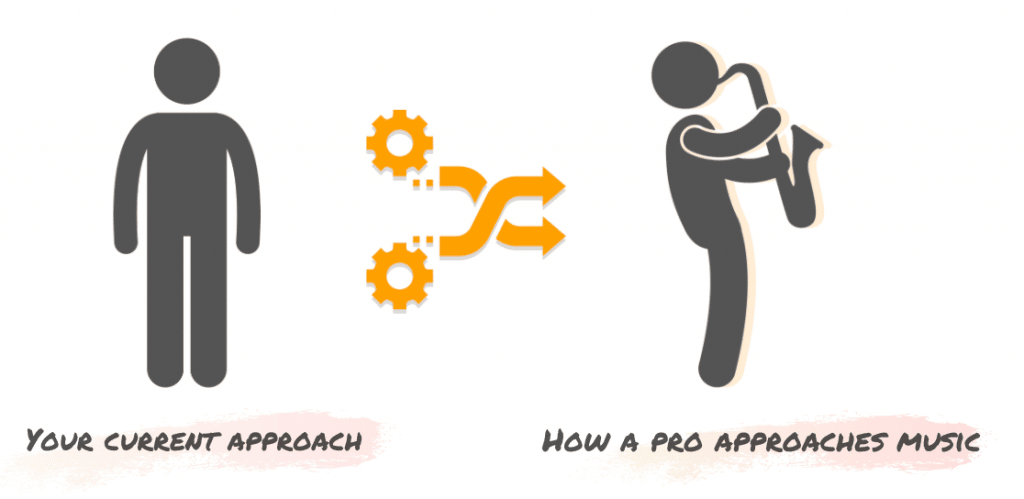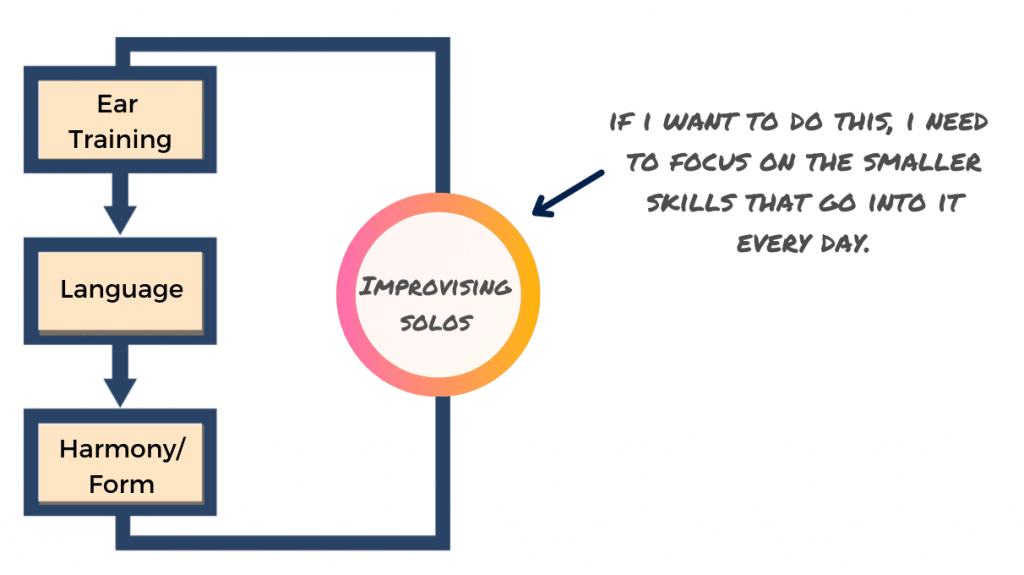So you want to change the way you play? To improve your sound and your solos. To become more effortless in your technique. To finally get rid of those bad habits and creative roadblocks in your playing…
Every aspiring musician can relate to these feelings and frustrations. But what does the process of getting better actually look like in the real world? And what sets the players that actually get there apart from the rest?
Well it all depends on who you ask…
For most musicians, the idea of improving conjures up visions of hours spent alone in a practice room. Of specific exercises and popular methods, of metronomes, lists of tunes, important solos to learn, and scales to memorize.
Over time we unconsciously get pushed into this idea that hours of effort in the practice room will automatically yield the results we desire. That improvement is something that will happen if we simply show up and check off the right boxes…
Unfortunately, improvement isn’t guaranteed or the automatic result of time and effort. It doesn’t just happen to you if you show up and have the right method or equipment. And this disparity can throw us off as we pursue our goals.
What we forget is that improvement isn’t the specific exercises we practice or how many hours we spend in the practice room, it’s how we approach the entire process of evolving as a musician.
If you want to get serious about improving and create change in your playing you have to make it personal. You need to define what improvement means for you, to specifically name it, to honestly assess what it’ll take to get there, and to work for it each day.
More than any practice plan or method, this type of improvement is directly tied to your mindset.
In this lesson we’ll explore how to adopt an improvement mindset for your goals in music and everything else, and more specifically, the four pieces of the puzzle that will allow you to start achieving your goals…
It starts with one belief
For any big goal you have, any skill that you’re attempting to master, or any problem that you’re trying to solve, the first step on your journey should begin with one thing…
The absolute belief that success is a real possibility.
Before you think about practicing, before you start running through exercises, and before you make assumptions about your ability…you’ve got to open the door to reaching your goal.
Start your journey believing that there is a pathway for you to improve, acknowledge that a solution to your problem exists, realize that of all the possible outcomes, one is you reaching your destination.
Now you might be thinking, this sounds obvious – we all make goals that we want to achieve, right?
Here’s the thing, many of the goals we make often exist as far off ideas. They live in the realm of “wouldn’t that be great,” of “I hope so” or “Maybe one day.” A kind of fantasy that we don’t have a say in, separate from the activities we do everyday.
However, it’s a different thing entirely to say “this is possible for me,” to define it as a real-world possibility for yourself. And adopting this mindset for every challenge or goal will transform your approach…
You have to unlock the possibility of reaching your goal in your mind before you can unlock it in your playing.
Even though it seems small and even inconsequential, this belief can have real-world effects. For instance, let’s say you’re listening to a recording of one of your favorite players…
As you listen, you might have different reactions. You can be the player that thinks:
- “No way, I can’t do that”
- “Well, maybe one day if I practice a lot”
- “This is possible for me, now how do I start learning these skills?”
All three reactions start from the same place – not being able to perform the skill – but only one is setting you up to improve. The first response immediately closes the door and the second pushes the goal into fantasy land. Only the third allows for improvement.
Be this player! Even though the end objective is not guaranteed, you are making progress and improving on your current skill level.
The same is true when you encounter a difficult tune or a technique that you can’t perform or a problem in your playing that you need to overcome. Be the player that knows a solution is out there and is actively trying to find it.
Try implementing this mindset for each of your goals and challenges. Imagine what your dream sound is, the technique you wish you had, the tunes you want to play over with ease, the level of playing that you’re striving for…admit to yourself that this is a real possibility for you.
Aim to carry this mindset with you each day before you walk into the practice room and you’ll begin seeing progress that eluded you before…
Rethink Your Approach
Now that you’ve opened up the possibility that your goal is achievable, your next job is to adjust your practice approach to one that more accurately lines up with your goal…
You need to construct a routine that resembles the habits of the player you one day want to become, and this is a process that won’t happen overnight.
Think of it like you’re slowly shaping yourself piece by piece into the form of what a successful player is. Taking raw material and refining it, making small tweaks that will make a difference over time.
To make this transformation you have to actively seek out information and apply it to your personal skillset and goals, and this is different for every player.
But there are two preliminary steps to this process that all players must go through:
- Make an honest assessment of your current skills: Take a close look at your goal. What can’t you do right now? What do you need to improve? What areas are holding you back? This is where you need to put your focus as you look for answers.
- How do successful players approach this goal? Next get more specific and identify the exact skills required to reach this goal. What practice approaches, mindsets, and exercises do successful players use to improve?
The first step is pretty self-explanatory, but how do you go about figuring out how successful players are approaching their practice and performance?
Well, with the internet this information is easier to access than you think. Simply search for the players that are playing at the level you aspire to. Look for interviews, masterclasses, and their writings. Listen to their recordings and disect their sound.
Aim to get inside their minds, and deconstruct how they think…
Seek out the book and methods they mention, the specific exercises or warm-ups they use. Find out the players they imitated and the teachers they studied with. Determine how they think about sound, harmony, & improvisation.
These are the small pieces of the puzzle that you need to start incorporating into your daily routine. If you want to get to the level of a certain player, you need to start approaching music like this player.
I find that the greatest musicians are all saying the same type of things – whether it’s about technique, mindset, or music. And this is usually different than we imagine and oftentimes stuff we don’t necessarily want to hear.
To figure out what to practice you have to dig into these details, to focus on the stuff that the majority of people ignore or cast aside. Put aside what you ‘think’ is right for a moment…What are these players actually saying?
As you begin to gather this information, start to look at your current routine and make a plan of action. How can you adjust one part of your next practice session to mimic a player that is successful?
Maybe it’s including some specific warm-up exercises, spending a few minutes on ear training, focusing on your breath, meditating to get into the right space before you practice…
Learn to love the process
Once you get to work in the practice room with these new objectives and adjustments, you’ll quickly realize that it’s not talent or luck that makes the difference…
It’s discipline and routine, actual work. And it all comes down to a very simple formula…
If I want to achieve this specific goal, I need to do x,y, and z every single day.
If you want to produce an efficient and beautiful sound on your instrument you need to focus on a particular set of skills every day in the practice room. If you want to be able to improvise easily over a standard, you need to focus another set of skills.
That big goal is the end result, and these small skills that are the daily work that will get you there. Improvement hinges on understanding this process and sticking to it on a consistent basis…
This often means resetting your expectation of what practice is and what the improvement process looks like. And to be honest it’s not all fun or easy…
But the benefit of this cut and dry approach is that it takes away the uncertainty in how to improve. It removes the idea that your playing is out of your control or that your success is left up to fate.
You are ultimately in control of how you sound and how you improvise, and it goes right back to your daily habits. You’re either focusing on the small elements of your goal or you’re not – plain and simple.
The key to continual success is embracing this routine and learning to love the process. And when you do eventually make progress, it’s very rewarding.
Become an expert in problem solving, in finding the paths forward when something doesn’t work. Of focusing on one detail and slowly mastering it. Trust that the process will get you to your goal.
Over time, you’ll recognize a pattern that happens with any skill, whether it’s technique, learning tunes, figuring out chords, or improvising solos – the process is always follows the same steps:
- You can’t perform a skill or don’t understand it
- You break it down into smaller “sub-skills” to learn
- Slowly build each skill consistently, make it a priority in your practice
- Put it all together and see progress
This is the cycle that you go through over and over. And you’ll begin to see the difference between players that stop at the ‘can’t do it’ stage, that give up or blindly attempt the entire goal over and over again.
Improvement is something that you have control over. Continually remind yourself that the “can’t do it” stage is just step one. Stick with the process, trust that it works, and enjoy the daily routine of it!
Always be evolving
The thing to remember is that improvement is a journey that you’re on. It’s a process that happens in cycles and something you’ll be working at for as long as you play music…
Once you solve one problem or acquire one skill or reach a new plateau – in some ways you are starting the process over,
You’ll make new goals, your objectives will slightly change, or your perspective shifts. What was acceptable before may no longer be good enough, it might even be holding you back!
And there you are back at step one again…
You’ll continually go through these steps over and over again as you work to reach your potential. The path you’re on has no end point, it’s a journey of continually getting better, learning new things, refining your skills, acquiring more knowledge.
Life-long improvement means learning how to learn, challenging your assumptions, and avoiding getting stuck in one approach or school of thought.
Realize that your viewpoints and approach will change over time. As you tackle new skills and work to overcome new problems, ask yourself:
Is this the only way to think about or approach this skill? Am I assuming something about the process? Am I putting it through this lens of my own limitations?
Continually challenge yourself to understand concepts more clearly, to approach technique at an even hight level, to constantly look for new avenues of information.
For instance, the way you define music, chords, or improvisation can and will change. The way you think about a chord progression or a tune, the players you study, the styles of music you draw from…
The more skills and knowledge you gain, the more your approach to these things will shift. And when this evolution occurs, you’ll know progress is happening.
What are you working on?
This idea of an improvement mindset can be applied to any skill or goal you have, not just music…
You might be learning a new language, picking up a new hobby, practicing new sport, or trying to overcome a specific difficulty.
The process for moving forward and the steps to success are the same:
- Change your mindset to one of possibility – believe and admit to yourself that your goal is possible.
- Find out how the experts do it – absorb the mindset, approach, specific skills, and habits of the people who have reached your goal
- Learn to love the process of building your skills, become an expert in breaking down skills and building them back up, one by one
- Strive to continually evolve – learn new skills and build on the ones you have, the journey is never over
Take these four steps with you into the practice room, remember them when you are listening to a solo that catches your ear, and pull them out when you encounter a problem in your playing…
When you find yourself hitting a wall, confused, or lost this process will push you toward improvement every single time!
















